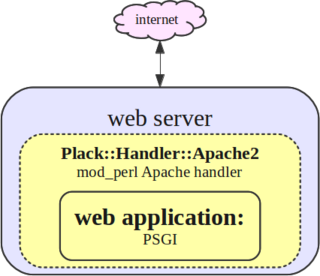This article may rely excessively on sources too closely associated with the subject, potentially preventing the article from being verifiable and neutral.(August 2014) (Learn how and when to remove this template message) |
mod_wsgi is an Apache HTTP Server module by Graham Dumpleton that provides a WSGI compliant interface for hosting Python based web applications under Apache. As of version 4.5.3, mod_wsgi supports Python 2 and 3 (starting from 2.6 and 3.2). [1]
The Apache HTTP Server, colloquially called Apache, is free and open-source cross-platform web server software, released under the terms of Apache License 2.0. Apache is developed and maintained by an open community of developers under the auspices of the Apache Software Foundation.
The Web Server Gateway Interface (WSGI) is a simple calling convention for web servers to forward requests to web applications or frameworks written in the Python programming language. The current version of WSGI, version 1.0.1, is specified in Python Enhancement Proposal (PEP) 3333.
Python is an interpreted, high-level, general-purpose programming language. Created by Guido van Rossum and first released in 1991, Python has a design philosophy that emphasizes code readability, notably using significant whitespace. It provides constructs that enable clear programming on both small and large scales. Van Rossum led the language community until July 2018.
Contents
It is an alternative to mod_python, CGI, and FastCGI solutions for Python-web integration. It was first available in 2007.
mod_python is an Apache HTTP Server module that integrates the Python programming language with the server. It is intended to provide a Python language binding for the Apache HTTP Server.
In computing, Common Gateway Interface (CGI) offers a standard protocol for web servers to execute programs that execute like console applications running on a server that generates web pages dynamically. Such programs are known as CGI scripts or simply as CGIs. The specifics of how the script is executed by the server are determined by the server. In the common case, a CGI script executes at the time a request is made and generates HTML.
FastCGI is a binary protocol for interfacing interactive programs with a web server. It is a variation on the earlier Common Gateway Interface (CGI). FastCGI's main aim is to reduce the overhead related to interfacing between web server and CGI programs, allowing a server to handle more web page requests per unit of time.


